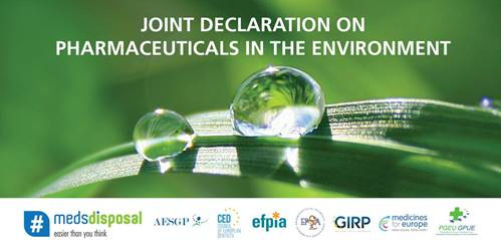




We, the signatories of this declaration, recognise and understand the concerns regarding the presence of pharmaceuticals in the environment.
We believe that these concerns can only be addressed through a dialogue with policy-makers, taking into account public health and environmental aspects, as well as their policy ramifications, and we pledge our commitment to remain open and constructive partners in this debate.
We look forward to the European Commission EU-wide strategy on pharmaceuticals in the environment. We call for a balanced approach that is mindful of the underlying essential role of medicines. We recognise that environmental protection contributes to safeguarding the health and safety of future generations; however, medicines also play a critical role in ensuring a high level of public health. As a matter of policy, we believe that any environmental-based measures should be clearly justified and guarantee patient access as well as access to the demonstrated benefits that medicines bring to public health.
We confirm our commitment to take actions in the areas where we can make a difference in order to reduce the presence of pharmaceuticals in the environment.
One such example of our commitment is the #medsdisposal campaign, a collaborative multi-stakeholder initiative aiming to raise public awareness about the correct disposal of unused and expired medicines. Around 8-10% of pharmaceutical substances in the environment originate from improperly disposed medicines – flushed down the toilet, poured into drains, or otherwise disposed inappropriately in household waste by patients or even by medical institutions [1],[2]. Educating citizens across the EU can therefore lead to a change in behaviour that can make a substantial difference.
While there is no evidence of harmful concentrations of active pharmaceutical ingredients in the European drinking water[3], we recognise that the possible impact of pharmaceuticals on the environment is generally unknown, and we support and encourage more research to identify and evaluate potential risks.
In addition, the representatives of the health sectors signing this declaration are taking additional actions in their own sectors to address the concerns around pharmaceuticals in the environment:
We would like to encourage more stakeholders to join and endorse the #medsdisposal campaign and pledge their commitment to address environmental concerns around pharmaceuticals. Should you be interested in doing so, do not hesitate to be in contact by email medsdisposal@gmail.com.
ABOUT US
#medsdisposal is a campaign to raise awareness on how to dispose of unused or expired medicines appropriately in Europe, bringing information on current disposal schemes in European countries to one place. It is a joint initiative between European healthcare, industry and student organisations including, among others:
AESGP
AESGP, the Association of the European Self-Medication Industry, is the representation of manufacturers of non-prescription medicines, food supplements and self-care medical devices in Europe. It is composed of national associations and the main multinational companies manufacturing self-care products. AESGP is the voice of more than 2000 companies operating in the consumer healthcare sector in Europe, affiliated with AESGP directly or indirectly through the national associations.
www.aesgp.eu
CED
The Council of European Dentists (CED) is a European not-for-profit association, which represents over 340,000 practising dentists through 32 national dental associations and chambers from 30 European countries. Its key objectives are to promote high standards of oral healthcare and effective patient-safety centred professional practice across Europe, including through regular contacts with other European organisations and EU institutions. The CED is registered in the Transparency Register with the ID number 4885579968-84.
EFPIA
The European Federation of Pharmaceutical Industries and Associations (EFPIA) represents the pharmaceutical industry operating in Europe. Through its direct membership of 33 national associations and 40 leading pharmaceutical companies, EFPIA is the voice on the EU scene of 1,900 companies committed to researching, developing and bringing to patients new medicines that will improve health and the quality of life around the world.
www.efpia.eu
EPSA
The European Pharmaceutical Students’ Association (EPSA) represents more than 160,000 students and recent graduates from 37 European countries. The Association has a permanent office in Brussels and conducts its activities through regular congresses, advocacy activities, training events, publications, exchange programmes and virtual presence. The mission of the Association is to actively engage at student and professional level, bringing pharmacy, knowledge and students together while promoting personal development.
www.epsa-online.org
GIRP
GIRP is the umbrella organization of pharmaceutical full-line wholesalers in Europe. It represents the national associations of over 750 pharmaceutical full-line wholesalers serving 34 European countries, including major pan-European pharmaceutical full-line wholesaling companies
www.girp.eu
MEDICINES FOR EUROPE
Medicines for Europe represents the generic, biosimilar and value added medicines industries across Europe. Its vision is to provide sustainable access to high quality medicines, based on 5 important pillars: patients, quality, value, sustainability and partnership. Its members employ 160,000 people at over 350 manufacturing and R&D sites in Europe, and invest up to 17% of their turnover in medical innovation. Medicines for Europe member companies across Europe are both increasing access to medicines and driving improved health outcomes. They play a key role in creating sustainable European healthcare systems by continuing to provide high quality, effective generic medicines, whilst also innovating to create new biosimilar medicines and bringing to market value added medicines, which deliver better health outcomes, greater efficiency and/or improved safety in the hospital setting for patients. For more information please follow us at www.medicinesforeurope.com and on Twitter @medicinesforEU.
PGEU
The Pharmaceutical Group of the European Union (PGEU) is the association representing the 400.000 community pharmacists from 32 countries across Europe.
www.pgeu.eu
[1] Kümmerer, 2009: The presence of pharmaceuticals in the environment due to human use: present knowledge and
future challenges. J. Environ. Manage. , 8:2354–2358.
[2] European Environmental Agency, Pharmaceuticals in the environment, 2010:
http://www.eea.europa.eu/publications/pharmaceuticals-in-the-environment-result-of-an-eea-workshop/at_download/file
[3] WHO, Pharmaceuticals in Drinking-water, 2011:
http://www.who.int/water_sanitation_health/publications/2011/pharmaceuticals_20110601.pdf